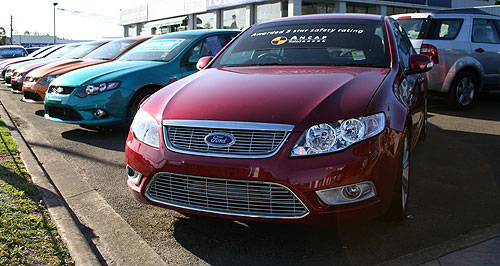Make / Model Search
News - General NewsThird parties after customer dataWheel and deal: National Automobile Dealers Association president Peter Welch believes tech giants such as Google and Yahoo are obtaining information on dealer customers. Dealers should maintain inventory to repel challenge from third party sellers: Welch12 Aug 2015 By IAN PORTER CAR dealers in the United States are being undermined by third-party operators attempting to gain access to customer data or intervening in the sales process and steal sales from established operators, the Australian Automotive Dealer Association (AADA) convention heard this week. These pressures, plus government interventions in the industry, made it important for dealers to stick together to maximise their influence and retail strength, according to Peter Welch, president of the US National Automobile Dealers Association (NADA). Delivering the keynote address, Mr Welch said people with little or no investment in bricks and mortar dealerships were “trying to get their noses under the tent”. These challenges made it important for dealers to main their inventories, which is their main competitive advantage against the interlopers. The new operators were trying to disrupt the usual dealer trading patterns with new electronic platforms in a bid to cut the dealer out of the sale, he said. Mr Welch also highlighted threats coming from technology giants such as Google and Yahoo. “Quite frankly, they’re out there. They are obtaining information on our customer base,” Mr Welch said. “They are trying to make your customers think that they are their customers, increasingly. “I would also include third-party regenerators or, quite frankly, electronic brokers. These are people who, with little or no investment in bricks and mortar – while you all have huge investments, cross-collateralised against your house in many instances – are trying to get their noses under the tent. “They want to convince consumers that they don’t need you, even though they don’t even own a vehicle inventory. They’re just out there honing in on the traditional dealer.” Mr Welch said car buying and ownership was already a three-cornered affair, with the owner, the dealer and the manufacturer involved. “It’s confusing enough for a customer to have an auto manufacturer and a dealer to deal with. To have three or four entities is not really something I think is sustainable.” He said maintaining inventory was a good insurance against the new challengers. “Very few people want to make a $30,000 or $40,000 investment before test driving it, without knowing where they can take it for repair, particularly because the vehicles are increasingly more sophisticated. “I tell our dealers don’t ever give up the inventory. That ensures your place in the food chain. “As long as you are there, I think the future is as rosy as ever.” However, with margins on new car sales so slim and the increasing reliance on finance and insurance as a source of profit, pressure is growing on smaller dealers, he said, although in this instance electronic technology may be of some help. “I am increasingly concerned about very small dealers. Thirty-nine per cent of the 15,000 members in the US sell fewer than 300 new cars a year, and their ability to fund those and to staff them appropriately gets tougher and tougher. “That’s why we need a lot of good robust vendors out there that can provide those and other members with these types of electronic business platforms. “I particularly applaud vendors who use as their primary customer base the dealer, as opposed to getting access to the customers directly.” Mr Welch also gave a rousing endorsement of the role a strong association can play in industry policy, although sometimes members can lose sight of the big picture. “When I take a look at associations like NADA and the AADA, I sometimes tell our board that sometimes the members question the expense of membership. “When they question the effectiveness of it, I always tell them it’s like maintaining a land army. “Nobody likes to have a military: its expensive, you have to pay tax to support it, you have to train them, you have to bivouac them, you have to go on manoeuvres, you have to feed them. “But when you need them, you need them, OK?“I think there are some close parallels there with dealer associations.” Mr Welch said that, after the global financial crisis started in 2008, NADA had to work hard to deflect some of the policies that politicians were proposing. “It turned out to be a job for dealers to go to congress and lobby for bridge loans. “The Republicans that were in charge said they didn’t think there should be a bailout. We didn’t agree with them although most of the dealers in the US are Republicans. “So there were some very interesting dialog. “I remember walking the halls of Congress in December of that year, three months before GM and Chrysler went into bankruptcy, basically begging to save the auto industry. “And, when they did it, I think it was the auto industry which pulled us out of the recession, quite frankly, in the US. “We were able to do many other good things with congress. We were able to pass some legislation to turn around some of the GM and Chrysler closures. We saved over 1000 dealerships that were slated for closure.”  Read more |
Click to shareGeneral News articlesResearch General News Motor industry news |











Facebook Twitter Instagram